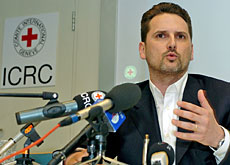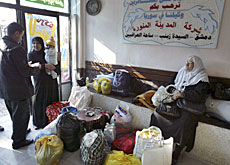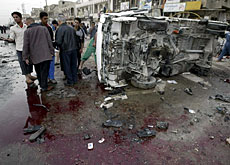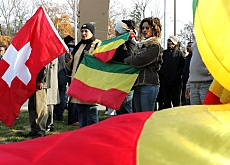ICRC says Iraq situation is deteriorating

The situation for civilians in Iraq is "ever-worsening", according to the International Committee of the Red Cross (ICRC).
The Swiss-run organisation said on Wednesday that this was despite security in some places improving as a result of stepped-up efforts by US-led multinational forces.
“It is clear that the security situation has improved in certain instances,” said Pierre Krähenbühl, director of operations of the ICRC, who highlighted southern Iraq in particular.
However, the overall picture of what was happening in the country had been steadily deteriorating, with numbers of refugees swelling, medical staff fleeing and other problems, he added.
“We’re certainly not seeing an immediate effect in terms of stabilisation for civilians at present. That is not our reading.”
The operations’ director – speaking on the release of a new ICRC report “Civilians Without Protection: the ever-worsening humanitarian crisis in Iraq” – said the central region, including Baghdad, remains greatly affected despite US efforts to secure the capital.
Krähenbühl revealed it was so dangerous for Red Cross workers to move around Baghdad that “we don’t have a full picture of absolutely every situation on a day-to-day basis”.
It was also difficult to determine the numbers of people killed in shootings, bombings and military operations.
“Immense suffering”
The new report states that: “The conflict in Iraq is inflicting immense suffering on the entire population. Every day dozens of people are killed and many more wounded.”
The ICRC continues to operate in Iraq even though it has cut back operations since attacks on its staff and Baghdad headquarters in 2003.
It has 415 Iraqis working for it in the country and has an additional 57 international staff based in Iraq and the Jordanian capital, Amman but relies on the affiliated Iraqi Red Crescent for much of its information.
According to the Iraqi Red Crescent, some 600,000 Iraqis have fled their homes since the upsurge in sectarian violence in February 2006.
There has also been an exodus of medical professionals fleeing the country after colleagues were killed or abducted.
“Hospitals and other key services are desperately short of staff,” Krähenbühl said. “According to the Iraqi Ministry of Health, more than half the doctors have already left the country.”
Thousands of bodies lie unclaimed in mortuaries, with family members either unaware that they are there or too afraid to recover them, he added.

More
International Committee of the Red Cross
Visiting detainees
Krähenbühl added that one of the ICRC key tasks was to visit the growing number of detainees.
“The number of people arrested or interned by the multinational forces has increased by 40 per cent since early 2006. The number of people held by the Iraqi authorities has also increased significantly,” he said.
The ICRC has visited 16,500 people held by the multinational forces since January.
Last year some 32,000 detainees were visited by the agency, which also has access to those held by the Kurdish regional government.
The ICRC has yet to reach an agreement with the Iraqi authorities on visiting their detainees.
swissinfo with agencies

More
Swiss Agency for Development and Cooperation (SDC)
The UNHCR estimates that some two million people out of a population of 26 million have left the country since 2003, mainly to neighbouring countries, and more than 1.8 million others have been displaced inside it.
While the numbers who have reached Europe have been comparatively small, some 20,000 applied for asylum in the EU last year, the figure is growing. Sweden, home to around 90,000 Iraqis, takes in the most – 47% of all requests – followed by the Netherlands, Germany, Greece, Britain and Belgium.
The most common routes into Western Europe are by road or boat via Turkey, Greece and the Balkans region. Very few arrive by plane.
Two-thirds of asylum seekers in Switzerland are Iraqi Kurds and 80% young men – women and children rarely manage to get as far as Europe.
The UNHCR will host a conference in Geneva next week (April 17-18) on how to address the humanitarian needs of refugees and internally displaced people in Iraq and the surrounding region.
According to UNHCR figures, some 500,000 Iraqis fled their homes for other places inside Iraq in 2006.
Number of Iraqis in neighbouring countries: Syria (1 million); Jordan (750,000); Lebanon (40,000); Egypt (20-80,000).
Number of Iraqis seeking asylum in Europe: 2005 (10,600), 2006 (19,000).
Number of Iraqis seeking asylum in Switzerland: 2000 (932), 2001 (1,219), 2002 (1,185), 2003 (1,458), 2004 (631), 2005 (468), 2006 (816).
At the end of 2006, there were officially around 6,000 Iraqis who had been admitted to Switzerland.
SDC’s 2007 budget for Iraq: SFr1.5 million; and SDC contribution to UNHCR refugee programme in Jordan and Syria: SFr2.5 million.

In compliance with the JTI standards
More: SWI swissinfo.ch certified by the Journalism Trust Initiative











You can find an overview of ongoing debates with our journalists here . Please join us!
If you want to start a conversation about a topic raised in this article or want to report factual errors, email us at english@swissinfo.ch.